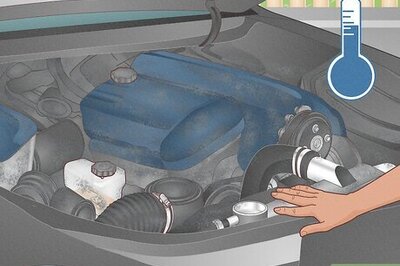
views
Want to lose weight but haven’t been able to yet? Well, it might have something to do with your BMI and BMR. These two parameters are as important as eating right and exercising in helping you lose weight and can help you gauge how many calories you need to eat and what caloric deficit you need to maintain to help you lose weight.
So what are your BMI and BMR? And how do they play into your weight loss goals?
Apart from the number on the scale, your BMI and BMR can help you plan your meals to stick to your weight loss plan and achieve your goals.
“Your BMI, or Body Mass Index, is a measure of the amount of body fat based on your height and weight. You must remember that your BMI only indicates the amount of fat you carry and can tell you if you fall into the underweight, overweight or healthy weight category. To calculate your BMI, you need to weigh yourself and divide that weight by your height in meters squared," says Dr. Mohit Bhandari, Allurion Expert, Director and Founder of Mohak Bariatrics, Indore.
Also Read: Milind Soman Turns 57: Know Actor’s Health and Fitness Mantra
If you’re trying to lose weight, lowering your BMI and getting into the healthy range can reduce your risk associated with being overweight such as hypertension, diabetes, heart disease and strokes.
A good way to do so is to stick to a regular exercise regimen and maintain a healthy diet. “And a vital component of a healthy diet that aids in weight loss is portion control. This means eating small, frequent, nutritious meals, exercising, and staying active," adds Dr Bhandari.
What role does BMR play in weight loss?
In contrast, your BMR, or Basal Metabolic Rate, is the number of calories you need just for your body to function. Knowing your BMR will help you determine how many calories you need to lose to be in the healthy BMI range.
Most of your daily caloric expenditure occurs without effort, activity, or even thought. Your body burns calories to keep your organs working, such as your heart beating and lungs breathing, whether you’re sleeping, talking on the phone, or just watching TV. “Your BMR is the sum of the calories required to maintain these fundamental bodily functions. The word ‘basal’ essentially means ‘base’, or the amount of energy (or calories) required to adequately supply every need of your body. To put things into perspective, half a kilogram of fat burns two calories a day, while half a kilogram of muscle burns almost six calories," shares Dr Bhandari.
Therefore, a better understanding of Your BMR can help you more effectively assess your daily caloric needs to create a caloric deficit, defined as having fewer calories than you expend as energy. This means you either reduce your caloric intake below your total daily energy expenditure or increase your total daily energy expenditure. And one great way to do that is to eat healthy, low-calorie meals.
What do you need to do to get the right BMI and BMR?
There are several ways to help lower your BMI and BMR, including making lifestyle changes, exercising regularly and eating healthy. This means you’d have to do at least 75 minutes of vigorous aerobic exercise, 150 minutes of moderate aerobic exercise, or a combination of both should be performed every week.
Dr Bhandari feels one would have to convert this healthy lifestyle into a habit and sustain it over the long run to maintain and keep the weight off – all of which need behaviour modifications. This can be challenging and requires determination and a sustained effort to maintain one’s diet and control the portion size of your meal.
So, what’s the solution?
While there are several methods to lose weight, using a non-invasive, procedure-less weight-loss solution, you can help you turn the tide. This is because it can not only help you maintain the proper portion size of your meals, but it can also help break up your entire caloric need for the day into small portions throughout the day. In addition, this technology can also help build healthy eating habits and teach you how to maintain the right portion of food over the long run. All of this, put together, can bring your BMI and BMR to a healthy range, aid you in forming healthy eating habits and sustain a healthy diet over the long term.
But don’t forget, eating right is half the battle. Exercising enough to burn calories can help you achieve that goal much faster.
Read all the Latest Lifestyle News here


















Comments
0 comment